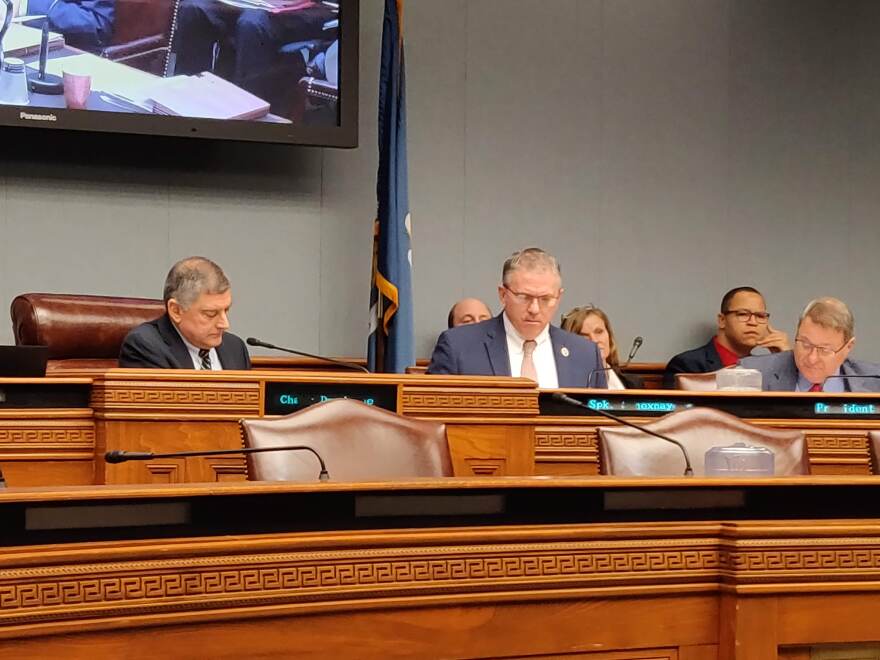Governor John Bel Edwards and top Republican lawmakers will start the 2020 legislative session locked in a familiar standoff.
On Friday, the Revenue Estimating Conference, or REC, couldn’t agree to update the state's official revenue projections. That means the governor’s executive budget would have to be based on last year’s estimate — about $100 million less than economists expect the state to have in the coming fiscal year.
By law, spending levels in the governor’s executive budget proposal must match projections that have been unanimously approved by the four-member panel.
Last year, House Republicans blocked the adoption of a new revenue forecast until April.
The mechanics of this year’s logjam are a little different.
The two newest members of the panel, House Speaker Clay Schexnayder and Senate President Page Cortez, said they did not oppose adopting a forecast, but not without some adjustments.
Schexnayder proposed an on-the-spot modification that would have eliminated the expected growth in sales tax collections. Doing so would have allowed the state to spend an additional $94 million for the current budget year and kept next year’s budget at a virtual standstill, adding only $400,000.
“One of my goals is to be conservative with the forecast,” Schexnayder said. “I’m not sure adopting an entire forecast amount is the most conservative route to take at this point.”
That was a non-starter for Commissioner of Administration Jay Dardenne, who urged the other members of the panel to accept the revenue forecast prepared by economists for his Division of Administration. It would have given the state an additional $170 million to spend in the current budget year and $103 million to spend next year.
“We may as well not have our economists if we’re going to arbitrarily sit here and say, ‘I want to knock this number down a little bit,’” Dardenne said.
Dardenne, Edwards’ top budget advisor and his representative on the REC, voted against Schexnayder’s proposed changes.
“It may satisfy some individual’s political objectives — not yours — but it’s not a compromise,” Dardenne said.
Dardenne argued that the “tweaks” were the kind of politically-minded manipulations that the REC was established to prevent.
Cortez said he understands Dardenne’s concerns but thinks members of the panel should be able to shape economists’s projections.
“Mr. Commissioner, I think that you're absolutely right. I don't think that we should tinker with REC and try to go outside the white lines, but what are those white lines?” Cortez said. “I think this is a valid option today… and I'm inclined to support it.”
Stephen Barnes, the independent economist on the panel, voted with Schexnayder and Cortez. It was Dardenne’s lone “no” vote that blocked the adoption of the forecast.
Edwards criticized Schexnayder and Cortez in a written statement after the meeting. He doubled down on some of Dardenne’s key talking points.
The vote is another data point for those trying to figure out how the new leaders will work with the Democratic Edwards.
At the start of the new term, House Republicans had the numbers to block Democrats from influencing the Speaker’s race.
That didn’t sit well with everyone in the Republican delegation, so Schexnayder defied conservative leaders and ran against their preferred candidate, Rep. Sherman Mack of Albany.
Schexnayder courted the votes of moderate Republicans and Democrats, and he won the speaker’s gavel with bipartisan support.
Republican party leaders said this vote would be a test of Schexnayder’s conservative credentials.
For his part, Schexnayder said pressure from the conservative wing of his party did not motivate his push for a lower revenue forecast.
“My whole objective with being speaker is to be able to find a path where we move things forward. This was my path right here,” Schexnayder said.
In an interview after the meeting, Schexnayder said he didn’t expect the pushback from Dardenne and the Edwards’ administration.
“It was reasonable, I thought, and it was some way for us to have an executive budget based on actual numbers,” Schexnayder said. “So yeah, I was surprised.”
Dardenne said the governor’s executive budget proposal for the upcoming 2020-21 fiscal year will include the $103 million that was not approved by REC last week. The details of that plan will be released Feb. 7.



